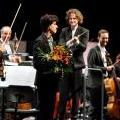Search the Community
Showing results for tags '75'.
-
Hello everybody! I am very busy with my final exams and auditions, so that is the reason why I have not been online for a while. Anyway, I composed a new 'neoclassical' composition for string quartet. Each movement is based on the letters of one of my friends' name. I used the letters A, B, C, D, E, F, G and Ut, Do, Re, Mi, Fa, So, La, Ti. The duration of each movement is pretty short, because I wanted to have the movements in balance. Some themes are namely pretty hard for me to compose more than two minutes. Enjoy and please comment! Sharing your opinion means a lot too! Maarten
-
Yes, it's the third of October, Steve Reich's seventy-fifth birthday! To celebrate, I would like to write about four of my favourite of his compositions starting with his 1965 work 'It's Gonna Rain.' this was the first work where Steve Reich uses the phasing technique (i.e. a short motif repeated over and over by two tape thingies or instruments with one playing at a slightly different speed to the other, making them go out of sync with each other). This work is a snippet of a preach about the apocalypse by the African-American Pentecostal preacher Brother Walter. The tape recording includes some background noise, most notably the sound of a pigeon flapping its wings at it takes off. When Steve Reich fed two tapes into two different tape machine thingies, he was hoping he would play both recordings of the same three words at different times with one starting halfway through the first one's entrance. Instead, by chance, he managed to press the play switch on both machines at exactly the same time! Whe he was listening to this repeating motif on both tape machines, he noticed that one was playing it back at a slightly slower speed than the other. This made the composer abandon his first idea and go with this new discovery he called 'pahsing.' Just to think, that if Steve Reich didn't come across this happy accident, we would have none of these fantastic phasing compositions today! The second piece I would like to write about is 'Four Organs.' Written in 1970 it is for four electric organs and a single maraca which does nothing apart from repeating a simple static pulse (quasi metronome) throughout the whole piece. The music played by the four organs is a slowly arpeggiated dominant eleven chord (the notes are E-D-E-F#-G#-A-B) that repeats itself many times, with each repeat longer played than the one before. The first time this chord is played it only lasts for a quaver, but goes on until it takes up 200 beats of music. Steve Reich called it 'The longest V-I cadence in history.' This composition also caused a riot when in was performed in Carnegie Hall, NYC, in 1973. There were people yelling for the music to stop and others applauding to quicken the end of the piece. One woman was banging her head on the stage and was wailing 'Stop! Stop! I confess!' One of the performers had to yell out the beats of music (just like Nijinsky at the premiere of 'Le Sacre du Printemps') so they could stay in time! This next piece is my absolute favourite of his. It was written from 1974-1976 and is called 'Music for 18 Musicians. With a combination of one violin and cello, four pianos, singers, xylophones, marimbas, clarinets and more, this was at the time the largest ensemble he had written for. The work is in eleven sections (or 'pulses') which are each based on a different chord. The piece is interesting as it uses a lot of the human breath to play the pulses that signify each section. The player plays the pulsing note for as long as he or she can hold it, while each chord is melodically deconstructed by the ensemble, along with augmentation of the notes held. At the end of each section, the metallophone would indicate when to go on playing the next one. The final piece I will write about is almost my absolute favourite. It is his 1988 piece entitled 'Different Trains,' a three movement work for string quartet and tape. Each movement of the work has a different title, the first being called America before the war, Europe during the war, and After the war. This composition uses spoken words from the tape doubled by the viola for women or the cello for men (a device the composer calls 'speech melody,' it is a similar idea that Schönberg had with sprechstimme) with the two violins imitating the sounds of a train. The words come from interviews from the people who survived World War II. During the work, actual sounds of train whistles and sirens are also heard in addition to three other pre-recorded quartets playing from the tape. It creates an exciting, dense texture that gives me images of fast maglev trains speeding through the countryside. So those are my favourite pieces by Steve Reich. I would like to know if any of you lot have been influenced by his inspirational music, and what are your favourite pieces by him?

